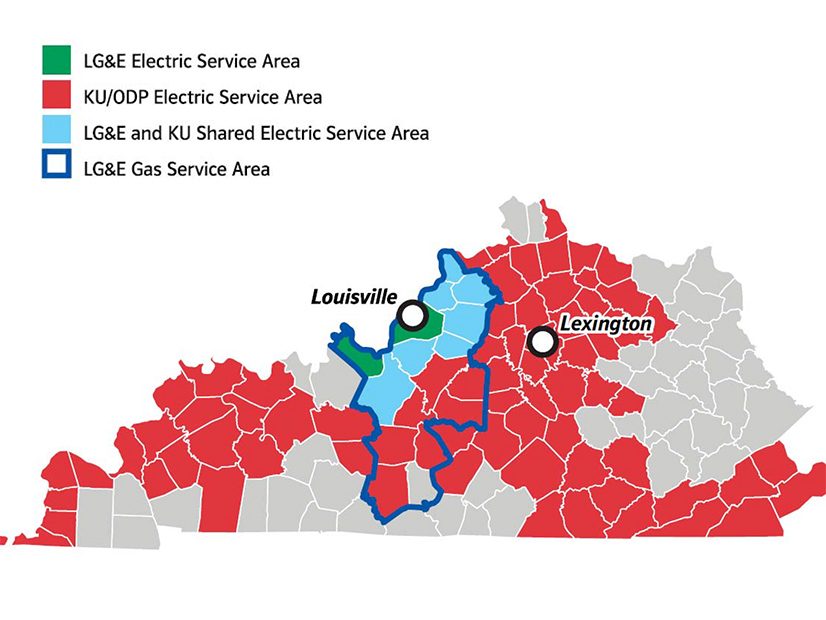FERC failed to consider the impact of potential rate increases when it allowed Louisville Gas and Electric (LG&E) and Kentucky Utilities (KU) to partially exit market power mitigation measures, the D.C. Circuit Court of Appeals ruled Friday (19-1236).
The court vacated parts of a March 2019 order and rehearing orders in September 2019 and September 2020 (ER19-2396, ER19-2397). (See FERC Again Rejects LG&E-KU Mitigation Exit.)
The commission imposed rate de-pancaking provisions to resolve horizontal market power concerns after LG&E and KU merged in 1998 and left MISO in 2006. The utility was acquired by PPL (NYSE:PPL) in 2010.
As a condition for allowing the utility to leave MISO, FERC required it to agree not to charge its wholesale power customers duplicative “pancaked” transmission rates for power shipped to or from MISO, so long as the RTO did the same.
In March 2019, the commission agreed the de-pancaking provisions — spelled out in the utility’s Schedule 402 — could be removed because loads located in its market would have access to enough competitive suppliers.
But the commission sought to protect customers that had made business decisions based on the de-pancaking provisions by requiring LG&E and KU not to end de-pancaking during a transition period. It set the transition at 10 years for the cities of Paducah and Princeton, Ky. (P&P), which had invested in the Prairie State coal-fired generator connected to the MISO grid.
The D.C. Circuit said that while “the commission reasonably found that sufficient competition would survive the return of pancaking, it was arbitrary and capricious for the agency to ignore the effect pancaking would have on rates.” It also said FERC failed to adequately explain two aspects of its transition requirements.
While there were no more than seven competitive wholesale energy suppliers for the grid when FERC approved the LG&E-KU merger, by 2018, more than 100 suppliers could competitively sell to the grid, the commission said.
LG&E and KU’s “neighbors include some of the largest independent grids on the continent — MISO and PJM Interconnection LLC — giving those customers ready access to independent power suppliers,” the court said.
But the court said FERC erred in “backhanding the effect that pancaking would have on rates.” It quoted an expert for municipal utilities protected by Schedule 402 who estimated that the end of de-pancaking would raise municipalities’ rates by at least 15%, with one customer’s rates rising 47%.
“Importantly, this rate analysis goes beyond just looking at competition because, as the commission has recognized, markets do not always function perfectly,” the court said. “Yet here, the commission expressly refused to even consider the effect ending de-pancaking would have on electricity rates. The commission held, instead, that because de-pancaking was imposed to protect competition, that was the only factor it needed to consider in ending the program.
“By refusing to consider the material effects of its order on customer rates — a factor that its own regulations identify as a key component of the public interest, the commission engaged in ‘unreasoned, arbitrary and capricious decision-making,’” the court concluded.
The court said that although vacating the commission’s action may cause some disruption, “that disruption seems unlikely to be severe, as our decision implicates in large part the same type of rates that are required to be de-pancaked in the short term under the transition mechanism. We therefore vacate the commission’s decision to permit [LG&E and KU] to end de-pancaking under Schedule 402 and remand for the agency to reconsider its decision in light of the direct and indirect effects ending de-pancaking would have on customers’ rates.”
Win for LG&E/KU
LG&E and KU claimed one victory in the appeal, convincing the court that FERC acted arbitrarily in extending the de-pancaking of P&P’s rates related to their investment in a hydroelectric project until their power agreements expire in 2057.
“That reasoning cannot be reconciled with the commission’s determination that the transition mechanism was meant to extend de-pancaking only for a ‘limited period of time.’ The commission had just said that 10 years of mitigation was enough to protect P&P’s similar long-term investment in Prairie State. Yet here, the commission concluded that mitigation must continue for an additional 38 years — simply because the hydropower agreements contained a concrete end date of 2057.
“That makes no sense. If 10 years of protection suffices for an ownership interest that continues ‘indefinitely,’ something in the neighborhood of 10 years would seem the relevant time frame to protect another exceptionally long investment,” the court said. “The commission failed to explain why the fact that an agreement will terminate by a date certain justified extending the mitigation term for nearly four decades.
“Should the commission conclude on remand that the public interest supports ending de-pancaking under Schedule 402, it must either better explain this aspect of the transition mechanism or take a fresh approach to the question,” the court said.
‘Inexplicable’ Rejection
The court also said FERC’s reasoning for declining to protect the entirety of the Kentucky Municipal Power Agency’s eight-year transmission reservation with MISO was “inexplicable.”
“The commission’s holding that transmission reservations are not ‘separate financial commitment[s]’ meriting independent protection was conclusory and inconsistent with the plain criteria of the transition mechanism,” the court said. “The commission’s competition finding does nothing to justify reaching a different result for transmission reservations than it did for power purchase agreements. The commission’s claim that de-pancaking Energy Agency’s entire transmission reservation would unduly extend its remedy to future power agreements was also baseless. …
“If the commission chooses again to end Schedule 402 de-pancaking on remand, it must come forward with a logical explanation for its decision here that is consistent with the purpose and scope of the transition mechanism, or it must extend de-pancaking on reasoned terms to Energy Agency’s transmission contract,” the court said.




